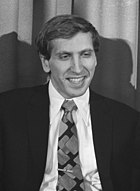
Anatoly Yevgenyevich Karpov is a Russian and former Soviet chess grandmaster, former World Chess Champion, and politician. He was the 12th World Chess Champion from 1975 to 1985, a three-time FIDE World Champion, twice World Chess champion as a member of the USSR team, and a six-time winner of Chess Olympiads as a member of the USSR team. The International Association of Chess Press awarded him nine Chess Oscars.
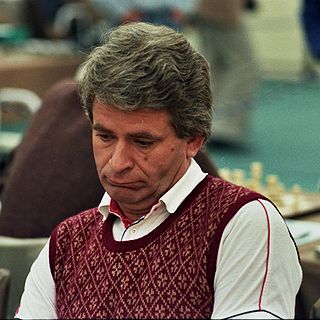
Boris Vasilievich Spassky is a Russian and former Soviet chess grandmaster who was the tenth World Chess Champion, holding the title from 1969 to 1972. Spassky played three world championship matches: he lost to Tigran Petrosian in 1966; defeated Petrosian in 1969 to become world champion; then lost to Bobby Fischer in a famous match in 1972.

Jan Timman is a Dutch chess grandmaster who was one of the world's leading chess players from the late 1970s to the early 1990s. At the peak of his career, he was considered to be the best non-Soviet player and was known as "The Best of the West". He has won the Dutch Chess Championship nine times and has been a Candidate for the World Chess Championship several times. He lost the title match of the 1993 FIDE World Championship against Anatoly Karpov.

Tigran Vardani Petrosian was a Soviet-Armenian chess grandmaster and the ninth World Chess Champion from 1963 to 1969. He was nicknamed "Iron Tigran" due to his almost-impenetrable defensive playing style, which emphasized safety above all else. Petrosian is often credited with popularizing chess in Armenia.

Yasser Seirawan is a Syrian-born American chess grandmaster and four-time United States champion. He won the World Junior Chess Championship in 1979. Seirawan is also a published chess author and commentator.
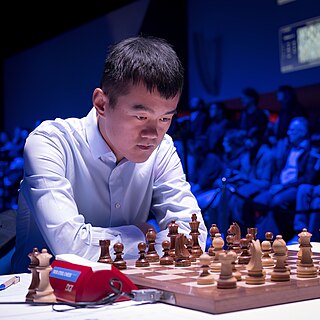
The World Chess Championship is played to determine the world champion in chess. The current world champion is Ding Liren, who defeated Ian Nepomniachtchi in the 2023 World Chess Championship after the previous champion Magnus Carlsen had declined to defend his title. As of December 2024, Ding is defending his title against Gukesh Dommaraju in the 2024 World Chess Championship tournament.

Mikhail Nekhemyevich Tal was a Soviet and Latvian chess player and the eighth World Chess Champion. He is considered a creative genius and is widely regarded as one of the most influential players in chess history. Tal played in an attacking and daring combinatorial style. His play was known above all for improvisation and unpredictability. Vladislav Zubok said of him, "Every game for him was as inimitable and invaluable as a poem".

Jørgen Bent Larsen was a Danish chess grandmaster and author. Known for his imaginative and unorthodox style of play, he was the second-strongest non-Soviet player, behind only Bobby Fischer, for much of the 1960s and 1970s. He is considered to be the strongest player born in Denmark and the strongest from Scandinavia until the emergence of Magnus Carlsen.

Robert Hübner is a German chess grandmaster, chess writer, and papyrologist. He was one of the world's leading players in the 1970s and early 1980s.
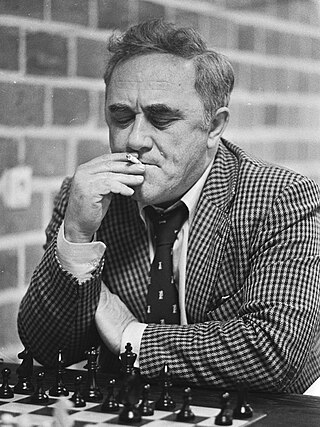
Efim Petrovich Geller was a Soviet chess player and world-class grandmaster at his peak. He won the Soviet Championship twice and was a Candidate for the World Championship on six occasions. He won four Ukrainian SSR Championship titles and shared first in the 1991 World Seniors' Championship, winning the title outright in 1992. His wife Oksana was a ballet dancer while his son Alexander was also a chess master. Geller was coach to World Champions Boris Spassky and Anatoly Karpov. He was also an author.
The Candidates Tournament is a chess tournament organized by FIDE, chess's international governing body, since 1950, as the final contest to determine the challenger for the World Chess Championship. The winner of the Candidates earns the right to a match for the World Championship against the incumbent world champion.
Several methods have been suggested for comparing the greatest chess players in history. There is agreement on a statistical system to rate the strengths of current players, called the Elo system, but disagreement about methods used to compare players from different generations who never competed against each other.

Robert James Fischer was an American chess grandmaster and the eleventh World Chess Champion. A chess prodigy, he won his first of a record eight US Championships at the age of 14. In 1964, he won with an 11–0 score, the only perfect score in the history of the tournament. Qualifying for the 1972 World Championship, Fischer swept matches with Mark Taimanov and Bent Larsen by 6–0 scores. After winning another qualifying match against Tigran Petrosian, Fischer won the title match against Boris Spassky of the USSR, in Reykjavík, Iceland. Publicized as a Cold War confrontation between the US and USSR, the match attracted more worldwide interest than any chess championship before or since.
There have been two chess matches featuring USSR vs. Rest of the World, in 1970 and 1984, and one match Russia vs. Rest of the World, in 2002. The USSR team won the first two matches and the "Rest of the World" team won the third match.
My Great Predecessors is a series of chess books written by former World Champion Garry Kasparov et al. The five volumes in the My Great Predecessors series are about the players who preceded Kasparov in being official World Champions. The series of books continued with the Modern Chess volumes that covers developments in the 1970s and Kasparov's games with Anatoly Karpov. The series is being extended with three volumes of Garry Kasparov on Garry Kasparov, covering his other games. The books contain historical details, but for the most part the books are made up of annotated games.

The World Chess Championship 1984–1985 was a match between challenger Garry Kasparov and defending champion Anatoly Karpov in Moscow from 10 September 1984 to 15 February 1985 for the World Chess Championship title. After 5 months and 48 games, the match was called off, with Karpov leading 5 to 3, and 40 draws. The match was replayed in the World Chess Championship 1985.
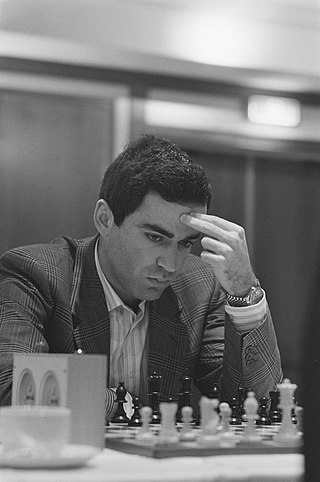
The World Chess Championship 1990 was played between Garry Kasparov and Anatoly Karpov. It was the fifth and final Kasparov–Karpov championship match, and saw Kasparov win by a single point.

The 1987 World Chess Championship was played between Anatoly Karpov and Garry Kasparov in Seville from October 12 to December 19, 1987. Before the 24th game, Kasparov was down 12–11, but in the 24th game, Kasparov made a comeback by using the English Opening to win the final game to retain his title.

Viktor Lvovich Korchnoi was a Soviet and Swiss chess grandmaster (GM) and chess writer. He is considered one of the strongest players never to have become World Chess Champion.
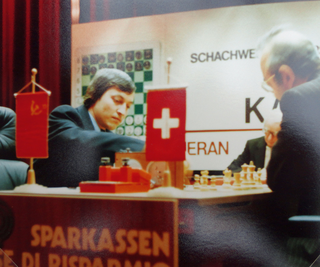
The major chess events of 1981 were the final match of the Candidates Tournament and the second Karpov–Korchnoi World Chess Championship match.
